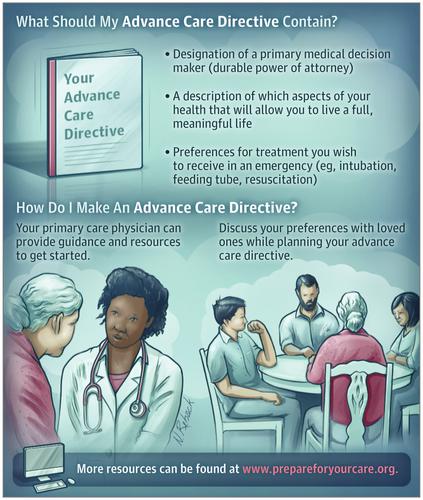JAMA Internal Medicine ( IF 22.5 ) Pub Date : 2020-01-01 , DOI: 10.1001/jamainternmed.2019.0005 John Landefeld 1 , Michael A Incze 1, 2

|
Advance care planning involves communicating your values, goals, and preferences about what kind of medical care you would like to receive if you become ill. When you are seriously ill, you may not be able to make decisions about medical care. Other people sometimes need to make these decisions for you. These decisions can be preferences about the types, location, or intensity of treatment that you would want to receive. Talking with your loved ones about your values and wishes, and documenting them in an advance directive will provide others with guidance to make the best decision for you.
A good place to start the conversation is to describe what in life is most important to you. For some people, this is being physically able to do things that they enjoy. For others, this is being mentally alert enough to spend time with family. Although this may feel uncomfortable, many family and friends say they wish their loved ones had spoken with them earlier about their wishes.
The best way to make sure that you receive the type of medical care that is in agreement with your values is to complete an advance directive. An advance directive is a document that contains your preferences about medical treatment. Physicians will use this to guide the type and intensity of treatments that they offer. Advance directives often include preferences about things including cardiopulmonary resuscitation, life support, and artificial nutrition. In an advance directive, you will identify a medical decision maker. This should be a family member or friend who knows you and your values and wishes well. Your physicians may contact your medical decision maker with questions about the types of medical treatment that you would want to receive if you are too ill to express your own wishes.
中文翻译:

预先护理计划——我应该知道什么?
预先护理计划涉及传达您的价值观、目标和偏好,了解您在生病时希望获得何种医疗护理。当您病重时,您可能无法做出有关医疗护理的决定。其他人有时需要为您做出这些决定。这些决定可以是您希望接受的治疗类型、位置或强度的偏好。与您所爱的人谈论您的价值观和愿望,并将它们记录在预先指示中,将为他人提供指导,帮助您做出最适合您的决定。
开始谈话的一个好地方是描述生活中什么对你最重要。对于某些人来说,这就是身体上能够做他们喜欢做的事情。对于其他人来说,这是精神上足够清醒,可以与家人共度时光。尽管这可能会让人感到不舒服,但许多家人和朋友表示,他们希望亲人早些与他们谈过他们的愿望。
确保您获得符合您价值观的医疗护理类型的最佳方法是完成预先指示。预先指示是包含您对医疗的偏好的文件。医生将使用它来指导他们提供的治疗类型和强度。预先指示通常包括对心肺复苏、生命支持和人工营养等事物的偏好。在预先指示中,您将确定医疗决策者。这应该是一位了解您和您的价值观并祝愿您的家人或朋友。如果您病得太重而无法表达自己的意愿,您的医生可能会联系您的医疗决策者,询问您希望接受的医疗类型。











































 京公网安备 11010802027423号
京公网安备 11010802027423号